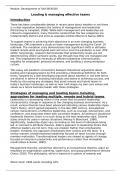Module: Development of Self (BFA530)
Leading & managing effective teams
Introduction
There has been considerable debate in recent years about whether or not there
is a clear separation between the notions of management and leadership
(McCartney & Campbell, 2006). While both management and leadership are
critical to organisations, many theorists contend that the two categories are
fundamentally distinct and exist as separate entities (Bennis & Nanus 2003).
To support teams in achieving their objectives in an ever-changing business
landscape, CMI undertook a study on team management during the Covid- 19
outbreak. The marathon crisis demonstrates that significant shifts in attitudes
toward remote work and hybrid work will occur once the pandemic is over (CMI
2020). Surprisingly, research demonstrates that productivity levels are not
determined by where someone works, but through how they are managed and
led. This emphasises the necessity of efficient leadership communication,
empathy for employees' personal situations, and building a strong workplace
culture.
This essay will establish connections between theoretical arguments about
leading and managing teams by first providing a theoretical definition for both
terms, followed by a well-developed argument about whether or not both terms
are distinct in terms of assisting individuals and teams in achieving success, and
finally by discussing any strategies that assist remote and hybrid teams in
today's business landscape, as well as how I will shape my own core values and
values as a future business leader with these strategies.
Strategies of managing and leading teams Including
approaches for leading multiple, remote and hybrid teams
Leadership is a developing notion in the sense that successful leadership'
characteristics change in response to the changing business environment. As a
result, various theories have been advanced indicating various leadership styles.
Trait's theory, which gained popularity in the late 20th century, presupposes
certain characteristics of effective leadership, such as courage, extraversion, and
confidence, and associates these with successful leaders. According to situational
leadership theories, there is no such thing as the best leadership style. Diverse
styles should be used in various situations (Hersey & Blanchard, 1988).
Significantly, leadership styles vary according on the level of individuals being
led. In contrast to attribute theories, Adair's approach to leadership thinks that
effective leaders are not born; they are created. Rather than emphasising
leaders' mindsets, the approach emphasises their actions and the team. In a
similar manner, transformational leadership focuses on team success through
member motivation. Transformational leaders are viewed as agents of change,
focused on long-term productivity and performance rather than immediate
results (Bass & Avolio, 1990).
Management theories, sometimes referred to as transactional theories, place an
emphasis on organisation, planning, supervision, and group performance (Kendra
Cherry 2020). This philosophy, which is based on a system of rewards and
Word count: 2500 words including 10%
, Module: Development of Self (BFA530)
consequences, calls for a form of transaction between followers and leader. This
means that employees are rewarded for higher performance and penalised for
mediocre performance. According to Tannenbaum and Schmidt Leadership, an
ideal leader should encourage members' engagement in decision-making. This
leadership style is typically associated with an increase in employee motivation,
since employees have a bigger say in how the organisation operates
(Tannenbaum & Schmidt, 1958).
A careful examination reveals that each of these has some benefits and
drawbacks. Adair's approach of action leadership appears to be out of date in
today's competitive business environment (Adair, 2007). Rather than
emphasising the importance of training and development, this approach focuses
on inherited characteristics, which may result in subjective interpretations among
different leaders. While situational theory is appropriate in that leadership styles
should be adapted to the circumstances, critics contend that it becomes obsolete
in the 'reality of constant change' (Hersey & Blanchard, 1988). Similarly,
participation is critical because it is dependent upon the individuals' abilities. If
members lack the necessary proficiency to participate in decision-making, their
participation may result in failures.
Simply put, choosing the incorrect leadership style may jeopardise the team's
performance. Indeed, the style that is most appropriate for a team is determined
by a variety of criteria, including the organisation's ability and maturity level. As
Bruce Tuckman (1965) observed, different leadership styles can be used
depending on the maturity level of the team. For instance, stage one (forming) is
the initial stage during which a team requires strong leadership. Therefore, a
directive or authoritative style may be more appropriate in this instance than
participation (Telling@ Situational leadership). In the second stage (Storming),
the team is establishing itself, and there may be power disputes and uncertainty.
Thus, the leader can establish two-way communication while simultaneously
offering instructions (Selling@ Situational leadership).
By employing systems thinking and understanding circumstances as loops rather
than particular events, some may change one's impressions of situations. Rather
of considering a situation as a single event, systems thinking enables everyone
to comprehend the complete context of a situation. By viewing each team
member as a component of the whole rather than an individual, we can see how
each person contributes to the team's shared vision. Not only must team
members understand who they are as individuals, but they must also have a
distinct identity as a working unit - a team mental model. The model that
demonstrates the relevance of this is the trust model, which further develops and
executes this through the use of a variety of technology that enables teams to
work remotely from the organisation (Barbara Brooks 2014). Though there are
numerous benefits, trust can be misused, and it is critical to check this by
monitoring the success of workers who work remotely on a regular basis. This
can be accomplished by regular one-on-one meetings or by setting realistic
deadlines.
A hybrid team should be efficient enough to leverage all of the company's
resources for the benefit and development of the business. Business managers
Word count: 2500 words including 10%




